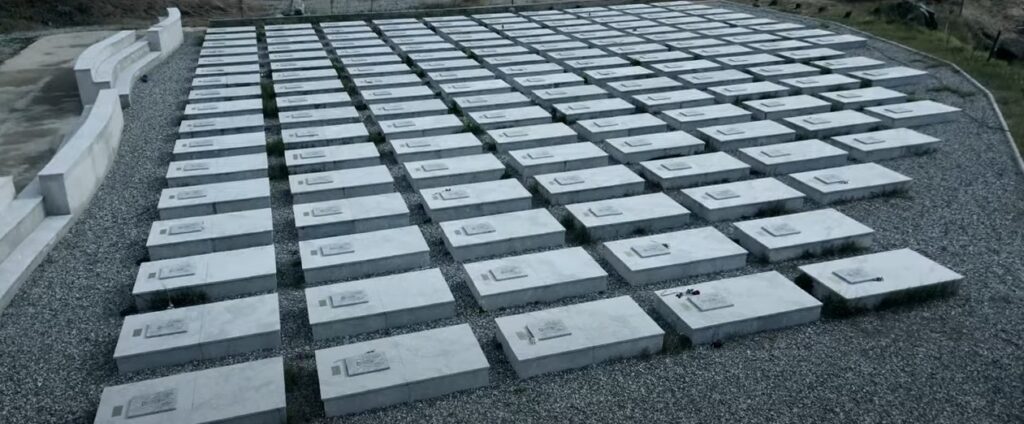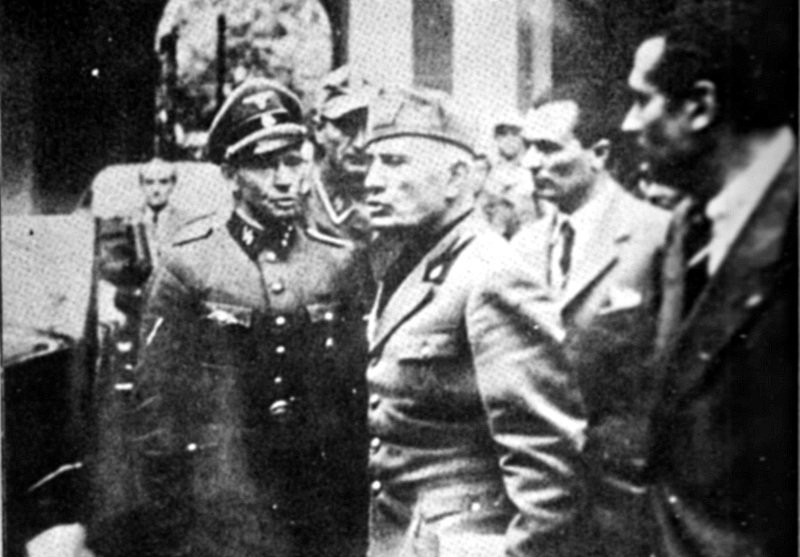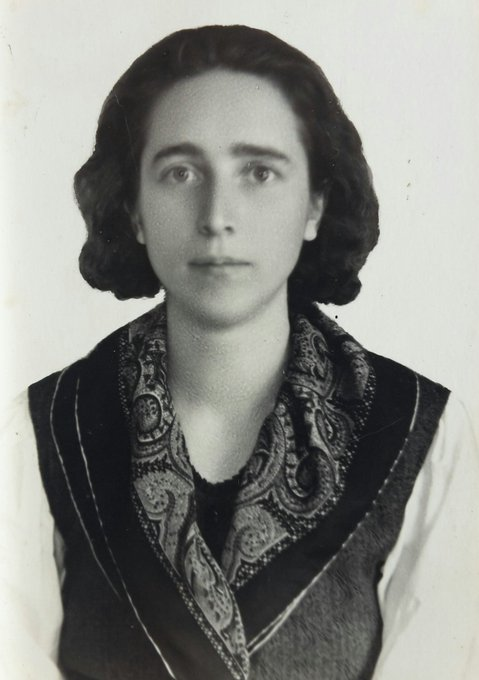At 1.30 a.m., in the night between 13 & 14 September 1943, the various units of Italian soldiers (12,000 in all), mostly conscripts of the Acqui Division, occupying the Greek island of Cephalonia, receive a message from their Commander, General Antonio Gandin [Thread] >> 1
It reads, "General Gandin hereby calls a referendum & invites officers & men to choose from the following alternatives: 1) continue fighting alongside the Germans; 2) surrender; 3) fight against the Germans. Results of the referendum must reach Divisional HQ by 10 a.m. >> 2
To understand what brought about such an unusual order in a military context & the terrible events that ensued as a consequence, we need to first look at what happened from 25 July 1943 onwards. On that date Mussolini was deposed by the Grand Council of Fascism & arrested >> 3
Mussolini is replaced by Marshal Badoglio (photo), who reaffirms the alliance with Germany but secretly seeks talks with Allies through Italian Royal Family contacts in the Vatican. Allies are hesitant at first, some reasoning that defeating Italy in the field is preferable >> 4 

General Castellano is sent to Lisbon to talk with the Allies & a meeting is set up in Sicily, which is already under Allied control. On 3rd September an armistice is signed in secret at Cassibile in Sicily by Gen. Castellano for Italy & Walter Bedell Smith for the Allies >> 5 
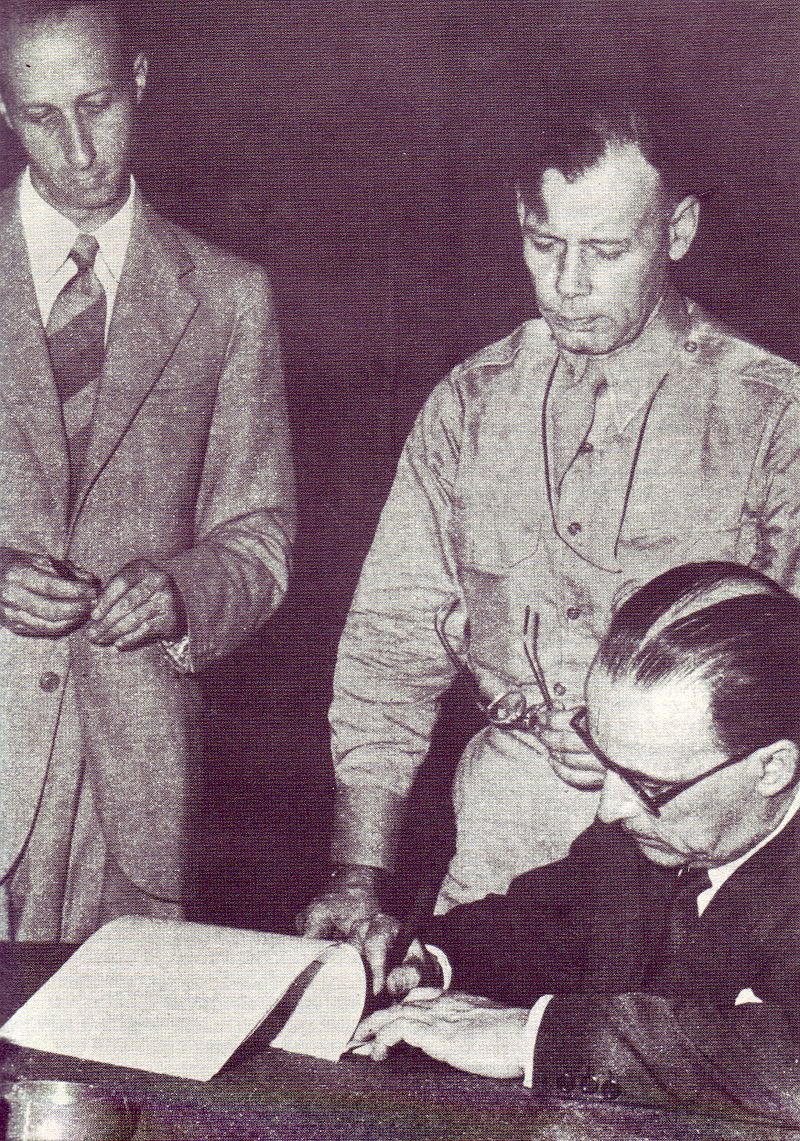
Date set for announcement of the armistice is 8 September. Italy asks Allies to send parachutists to defend Rome from the Germans following armistice but, on 7 September, Italian Commander in Rome reports insufficient fuel & ammunition to hold the city, so plan is scrapped >> 6
Consequently, Badoglio asks for announcement of the armistice to be delayed for a few days. Eisenhower, perhaps wary of Italian intentions, decides to go ahead with the announcement in any case and this is done via Radio Algiers at 18.30 on 8 Spetember 1943 >> 7
At this point the Italians have no alternative but to follow suit and Badoglio announces the armistice on the radio at 19.45. The announcement catches Italian troops completely unawares and chaos ensues >> 8
Orders are slow to be sent and often contradictory. The High Command is in complete disarray as the King and many senior officers flee to Brindisi to avoid capture by the Germans >> 9 

Italian troops in northern Italy mostly try to return home, some join resistance, others stay loyal to the Axis, others fight the Germans. Poorly equipped & demoralised, thousands are captured and sent to concentration camps. Resistance to Germans is successful in Corsica >> 10
The Germans set in motion Operation Achse, for the occupation of Italy & disarming of Italian forces in the event of surrender. The plan provides for deportation of captured Italian troops to concentration/labour camps. They are not to be given prisoner of war status >> 11
Italian troops in France, the Balkans & Greece do not have the opportunity to just abandon their posts and make their way home. Some attempt to fight their way back to Italy, but only a handful succeed. Mostly, they are disarmed & deported >> 12
The troops stationed on Greek islands, such as Cephalonia or Corfù, find themselves in a peculiar position. They outnumber the German forces on the same islands but depend on the Germans for sea transport >> 13
The German troops on the islands are better equipped and trainerd Moreover, the Germans can be quickly reinforced and supplied, whereas the Italians now find themselves cut off from any chance of fresh supplies of food or ammunition >> 14
Before the announcement of the armistice, the situation on Cephalonia was calm. The war seemed far off, Italian troops had become hopeful of it ending, at least for them, ever since the deposition of Mussolini on 25 July >> 15
Relations with the local population were quite good. There had even been marriages between Italian soldiers & local women. These were officially forbidden but Italian officers often turned a blind eye. The German garrison was much smaller & confined to the Livxouri peninsula >>16
The only event of note in the days leading up to 8 September is the arrival of Lt. Col. Fioretti, General Gandin's new Chief of Staff. Gandin is noted as a supporter of the alliance with Germany. He has fought in Russia & been awarded the Iron Cross 1st Class by the Germans >> 17
Fioretti has arrived directly from Rome & Gandin perhaps senses that this appointment is a kind of 'counterbalance' with Fioretti representing the new Badoglio government. He asks Fioretti about possibile developments & the latter says he can't exclude surprises >> 18
The two men get on fairly well together although, when addressing each other, Gandin continues to use 'voi', as imposed by the fascist régime, while Fioretti uses 'lei'. This more usual form was considered bourgeois by Mussolini. Now he's gone, 'lei' is coming back into use >> 19
In the afternoon of 7 September, a seaplane lands in the Bay of Argostoli , carrying General Marghinotti, Commander of the 8th Army, to which the Acqui Division belongs. He is here for an inspection of the men and defences on the island >> 20
General Marghinotti is also an appointment made by the Badoglio government. In the morning of 8 September, Marghinotti & Gandin, along with their Chiefs of Staff tour the island inspecting various positions occupied by the Italian forces: infantry, Carabinieri & artillery >> 21
The inspection arrives at n°3 battery of 33rd Artillery, commanded by Capt. Apollonio. It's lunch time & Apollonio invites the Generals to eat. They'ree surprised by the quality & variety of food: ham, peas & tuna. They compliment Col. Romagnoli, commanding 33rd Artillery >> 22
Col. Romagnoli himself is surprised and, when the Generals leave, calls Capt. Apollonio for an explanation. Apollonio tells him his men recovered a large quantity of canned ham, peas & tuna washed up on the beach following the sinking of a German cargo ship by a submarine >> 23
Apollonio has ordered his men to keep quiet about it for fear that the Germans will find out about it and demand the return of the food. Romagnoli laughs but orders Apollonio to distribute the food equally among the various artillery batteries >> 24
In the afternoon of 8 September, at Divisional Command, senior officers relax over coffee & cigarettes. The rest of the inspection tour is scheduled for the next morning. The relaxed atmosphere is deceptive, however. Conversation naturally turns to the situation in Italy >> 25
Sicily, Calabria & Puglia have been conquered by the Allies. Carabinieri report increasing numbers of German troops throughout Italy, preparing for occupation in the event of an Italian surrender. The question on everybody's lips is, "what is Badoglio planning to do?" >> 26
At 6.30 p.m. the bombshell. A young officer rushes in with the news that Radio Algiers has announced Italy has signed an armistice with the Allies. High Command in Rome confirms the news but gives no orders. At 19.42, Badoglio announces on the armistice on Italian radio >> 27
Badoglio says that all hostilities with the Allies are to cease but Italian forces should respond to any attacks made on them from whatever source. A message from Gen. Vecchiarelli in Athens says, "...respond with force to armed provocation. Everyone remain at their post..." >>28
Gen. Gandin (photo, left) & Lt. Col. Fioretti (photo, right) exchange glances. Gandin is silent, tense. Fioretti's only comment is that they should have done this on 25 July. The 2 men realise the possible consequences. The troops, however, have started euphoric celebrations >>29 

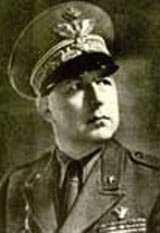
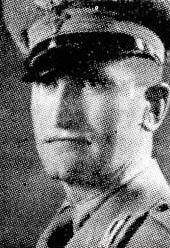
Gandin's anxiety is not helped by a call from Lt. Col. Barge, (photo),Commander of German forces on the island. The 2 men are on good terms. Gandin does not inform Barge of the message from Athens, simply telling him that he has not received any specific orders on how to act >>30 
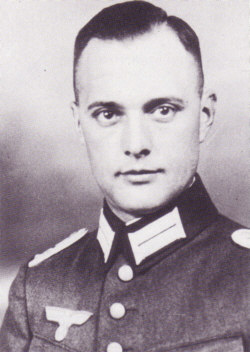
Gandin & Fioretti attempt to reach Italian Command on the Greek mainland without success. They listen to radio news confirming the Germans have overrun Italian positions in Italy, Greece & Dalmatia. As Fioretti says, the Germans seemed to know beforehand what would happen >> 31
It's 11 p.m. Gandin puts an end to his troops' celebrations & orders his units into positions preventing the Germans from moving against them unexpectedly, particularly the town of Argostoli. He receives a message from Col. Lusignani on Corfù saying things there are calm >> 32
Dawn on 9 September 1943, Col. Romagnoli commanding the artillery, orders n°1 battery under Capt. Pampaloni & n° 3 battery under Capt. Apollonio defending the bridge on the road into Argostoli that they must prevent the Germans from crossing it >> 33
Soon after, a German column is reported to be approaching Argostoli. The two Captains order their artillery pieces loaded. Before the column comes into sight, Col. Romagnoli's adjutant arrives with the order not to fire on the German column >> 34
Gen. Gandin has granted permission for the Germans to enter Argostoli to collect supplies, on condition that they return immediately to Livxouri. At 9 a.m. Lt. Col. Barge, the German Commander arrives at Italian HQ in Argostoli & is greeted by Gen. Gandin with a handshake >> 35
Over coffee, Gandin informs Barge of the contents of the message received from Athens the previous evening. Fioretti asks what orders Barge has received. He replies that he has received no specific orders & will therefore not change his behaviour towards the Italians >> 36
At this point, Fioretti intervenes and asks whether Germans overrunning Italian positions in Greece does not constitute a change of behaviour. Gandin defuses the situation and invited Barge to lunch at 1 p.m. to discuss how to handle the situation >> 37
At 1 p.m., however, it is not Barge who turns up but a Lt. Fauth. Gandin hides his annoyance. Fauth toasts German-Italian friendship & exudes confidence in a peaceful solution. It is during this lunch that a second coded message arrives from Gen. Vecchiarelli in Athens >> 38
The message orders them to surrender to the Germans without offering resistance. Gandin is astonished. Fioretti is suspicious. They attempt to contact Italian Command in Athens without success. The radio operator says that the operator in Athens was new & unknown to him >> 39
They then attempt to reach Gen. Marghinotti in Agrignon, again without success. At this point, they rightly presume that the Italian Command structure has fallen into German hands. Fioretti refuses to re-enter the room and finish lunch with Fauth, leaving Gandin to do so >> 40
The mood among Italian troops has sobered since Gen. Gandin put an end to their celebrations. Rumours of Italian positions being occupied by the Germans on the Greek mainland and other islands give cause for reflection & thoughts of possible difficult decisions to make soon >> 41
On the morning of 10 September, Gandin calls a meeting of his senior officers: Gen. Gherzi (infantry, top left), Col. Romagnoli (artillery, top right), Commander Mastrangelo (navy, bottom left), Major Federico Filippini (military engineers, bottom right) >> 42 




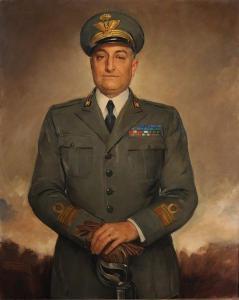
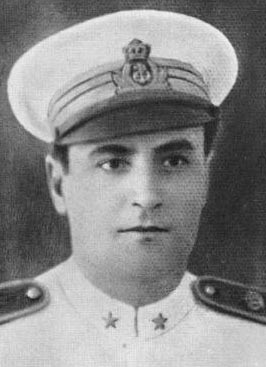
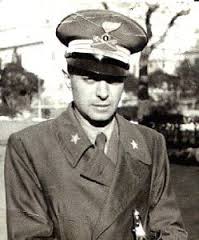
Also present are Col. Cessari & Col. Ricci responsible for the two zones of the island controlled by the Italians, while the third zone is controlled by the Germans.
As yet, there are no demands for the Italians to surrender but they all know it is only a matter of time >> 43
As yet, there are no demands for the Italians to surrender but they all know it is only a matter of time >> 43
Gandin informs them that Italian commanders in Greece appear to have been taken prisoner by the Germans. They can expect no further orders & must act Independently. He proposes abandoning certain positions to placate the Germans, without compromising the strategic position >> 44
Mastrangelo & Romagnoli are the only ones to protest. Speaking in 1983, Capt. Renzo Apollonio (see tweets 22-24 & photo below), by then a General, testified to how this early hesitation & indecision, especially the decision to abandon positions, was to prove a fatal error >> 45 

In the late evening of 10 September, Gandin receives the visit of Greek Army Captain Galiatsatos. It is not clear how he arrived on the island. He says he represents the Allies & urges the Italians to resist, promising Allied air support. Gandin feels unable to give an answer>>46
Dawn on 11 September. Galiatsatos informs Allied Supreme Command of his meeting with Gandin. The Allies decide it is impossible to wait for a decision. It would be too late as the Germans would have time to reinforce air cover. The Acqui Division is abandoned to its fate >> 47
8 a.m. on 11 September 1943. The Italian High Command, which had been silent since 8 September as the King and senior officers fled from Rome to Brindisi (which was in Allied hands) orders Gen. Gandin to consider the Germans as enemy troops >> 48
Gandin hardly has time to ponder the momentousness of this message before another one arrives: the long expected ultimatum from Lt. Col. Barge. The Italians must decide whether to continue fighting alongside the Germans or, otherwise, surrender by 6 p.m. on 12 September >> 49
Gandin informs Fioretti of the new message & says the only alternative is to gain time. The same morning a fishing boat arrives in Fiskardo, in the nortn-east of Cephalonia. It is carrying Italian soldiers, most of them wounded, who escaped capture by the Germans on Lefkada >> 50
This causes anger among the Italian troops & lively discussions begin among men & officers as to the appropriate course of action. In the afternoon, Gandin calls a new meeting of senior officers & a separate meeting of the 17 military chaplains >> 51
Among the chaplains, all but one consider surrender to be the best option and, when Gandin proposes this to his senior officers they agree, albeit after a lengthy & heated discussion. Again, Mastrangelo & Romagnoli are the only ones to dissent >> 52
7 p.m. on 11 September 1943. Gandin calls Barge & tells him that the Italians are prepared to negotiate terms of surrender. Barge sends Lt. Fauth, while Gandin sends Lt. Col. Fioretti. At 3.30 a.m., Fauth abandons the negotiations, offended by Fioretti's aggressive attitude >> 53
4 a.m. on 12 September 1943. Following interruption of negotiations, Gen. Gandin sends a letter to Lt. Col. Barge requesting resumption of talks & indicating, "in principle, the Division is prepared to surrender." Gandin is unaware that the mood among his troops is changing >> 54
The soldiers who arrived on the fishing boat from Lefkada confirm the rumours that Italians who surrender are being deported to labour camps in Germany. In the morning of 12 September leaflets printed by the Greek resistance are circulating among Italian units >> 55
Troops of the 33rd Artillery, in particular those of Capt. Apollonio's n° 3 battery, distribute arms to members of the Greek resistance. Capt. Vasco, commanding the Carabinieri contingent, takes a personal initiatve & releases all the 300 or so Greek political prisoners >> 56
In the afternoon of 12 September, rumours circulate among the troops of Gandin's intention to surrender & anger grows. Lt. Col. Barge informs his superior on the mainland, Gen. Lanz, that the Italians will start to surrender their weapons at 8 a.m. next day, 13 September >> 57
The same afternoon, German units move from the Lixouri peninsula & surround the two Italian artillery batteries nearest their positions. Capt. Zebei, commanding one of the two batteries calls Divisional HQ for instructions >> 58
The call is taken by Capt. Italo Postal, who rushes into the meeting of senior officers that has just got under way. Col. Romagnoli, commander of artillery, looks at Gen. Gandin, who remains silent >> 59
Knowing that he cannot take a personal initiative with talks still in progress, Romagnoli tells Postal that, in the presence of superior forces, Zebei should surrender. Capt. Apollonio calls Zebei urging him to resist & offering support but learns of the order to surrender >> 60
Apollonio, together with fellow battery commanders Capt. Pampaloni, Capt. Pantano & Lt. Ambrosini, rushes to Command HQ and, through Col. Romagnoli, asks to be received by Gen. Gandin. They ask Gandin to be able to respect the orders of the legitimate government in Rome >> 61
Gandin finds himself in an impossible position. His sense of duty pushes him to follow orders from Rome but his sense of responsibility for his troops' safety tells him that fighting the Germans will lead to disaster >> 62
Despite news of Italian soldiers on other islands being deported, he is perhaps hopeful that his good relations with the German commander & decorated service fighting in Russia alongside the Germans will help secure a better outcome for his men >> 63
In any case, it can be excluded that he was too "pro-German". Some of his men thought this & some Greek resistance members had suggested eliminating him. This was vehemently opposed by Capt. Apollonio himself. Though critical of Gandin, he evidently believed in his good faith>>64
Gandin promises Apollonio & the others that he will work for an honourable surrender & that any further German provocation or alteration of the status quo will be met with force >> 65
Dawn on 13 September 1943. A German officer arrives at Italian HQ to continue talks. It is not Lt. Col Barge, nor even Lt. Fauth, but a very young 2nd Lieutenant. Fioretti is furious at this snub but relays a message to Gandin that the Germans demand surrender of artillery >> 66
6.30 a.m. on 13 September 1943, Capt. Pampaloni of n° 1 battery is smoking his first cigarette of the day when, through the haze, he spots two German barges approaching their base in Lixouri. He immediately contacts Apollonio at n° 3 battery & Ambrosini at n° 5 battery >> 67
"What should we do?" he asks. Apollonio, with a touch of irony, says, "follow Gandin's order. This is a clear violation of the status quo." At 6.50 a.m., batteries n° 1, 3 & 5 open fire on the German barges. Fire is returned from the barges & base. One of the barges sinks >> 68
On hearing the artillery firing, Lt. Col. Fioretti rushes to call the Artillery Command ordering them to cease fire. Capt. Postal assures him that the order to open fire did not come from them. Postal attempts to contact n° 1 battery, but the line has been damaged >> 69
He manages to contact n° 5 battery but the operator replies they're following Apollonio's orders. When Postal reaches Apollonio, he answers he'll only cease fire if the Germans do likewise. Then, Postal rides a motorbike to Apollonio's battery & convinces him to cease fire >> 70
Meanwhile, the second barge has sunk & 8 German soldiers have been killed. At 8 a.m. a German flying boat arrives, having circled overhead awaiting the end of the artillery fire. It is carrying Lt.Col. Busch of the Luftwaffe & Capt. Arnaldo Brezzi of the Italian Air Force >> 71
Busch brings a message for Gandin from Mussolini, who had been freed the day before by German paratroopers from his prison in the mountains of central Italy. Mussolini invited him & his men to join his new 'Italian Social Republic'. Brezzi assured him of an important post >> 72
Here we see Gandin's true colours because he immediately declines the offer. Instead, he attempts to use Busch's presence to his troops' benefit, seeking assurances that, of they surrender, they will be sent back to Italy & will be able to keep their weapons in the meantime >> 73
Busch assures Gandin that these conditions will be respected but when he returns to the German base at Lixouri he makes no mention of this assurance & leaves everything in the hands of Barge >> 74
At 11 a.m. on 13 September, a group of Greek resistance fighters from the EPON, supported by Italian soldiers from n° 3 battery, led by Capt. Apollonio, attack a position held by German engineers, killing their commander & taking 14 prisoners >> 75
Apollonio insists that the Gteeks spare the lives of the German prisoners, an act that would later save his life as well. At 4 p.m these prisoners will be exchanged for the Italians of n° 2 battery captured near Lixouri the previous day >> 76
Following this attack, Barge is aware he's losing control of the situation & contacts his superior on the mainland, Gen. Hubert Lanz. Lanz arrives by plane at 1.30 p.m. He immediately calls Gandin & demands the Italians begin to surrender their weapons at 4.12 a.m. next day >> 77
Gandin is silent. Thinking he hasn't understood, Lanz calls for an interpreter. In impeccable German, Gandin says he understands perfectly. Lanz is confused & angry. He believed Gandin to be a friend of Germany. He ends the call threatening to use force to disarm the Italians>>78
On the evening of 13 September, Gandin calls another meeting of senior officers. There is excited conversation as news has arrived from Corfù, where Italian forces commanded by Col. Lusignani have overcone the German garrison >> 79
Some officers, especially Romagnoli & Mastrangelo protest at Gandin's insistence on seeking surrender terms & say they'll refuse to surrender their artillery. Gandin knows Lusignani's success is illusory (indeed, the Corfù garrison will meet the same fate as Cephalonia) >> 80
Romagnoli & Mastrangelo raise their voices, Fioretti raises his in an attempt to bring the meeting to order. Then Gandin, irritated by the atmosphere brusquely brings the meeting to an end, without any decisions having been taken >> 81
Gandin & Fioretti are left alone. They light up cigarettes. Gandin is convinced his men are tired of war & just want to be able to return home. This is his most fundamental mistake. Even Fioretti thinks the wish to resist is limited to a few 'hothead' younger officers >> 82
At this point Gandin makes his extraordinary decision. He asks Fioretti to take a despatch. Fioretti sits at the desk & Gandin dictates the message that, due to his failure to read his men"s mood, will lead to the virtual annihilation of the 12,000 troops under his command >> 83
The message reads, "Gen. Gandin hereby calls a referendum & invites officers & men to choose from the following alternatives: 1) continue fighting alongside the Germans; 2) surrender; 3) fight against the Germans. Results of the referendum must reach Divisional HQ by 10 a.m.">>84
The message Is sent out at 1.30 a.m. on 14 September. At dawn, the commanders of the various units call their men together to choose. There is no official record of the vote, different units 'voted' in different ways but all anecdotal evidence points to things going thus >> 85
Nobody votes to continue fighting alongside the Germans. Almost everybody votes to fight against the Germans. A few vote to surrender but, out of embarrassment, change their vote to fall in line with their comrades. It seems that nobody begrudges their original choice >> 86
We can only imagine how those young recruits feel when making their decision. Mussolini had been in power for 20 years. They'd lived their whole life, or most of it, under a dictatorship & the last 3 years as soldiers. The idea that they can choose for themselves is alien >> 87
Yet, they seem able to make a mature decision. None of them believe, as their Commander apparently does, that there is any hope of being treated honourably if they surrender. In that case, all that awaits them is deportation to labour camps and a slow death >> 88
Fighting gives them a minimal chance of survival with honour or, at worst, an honourable death. When Gandin reads the results from the various units at 10 a.m., he is like an anguished father whose children have decided to ignore his advice & undertake a perilous enterprise >> 89
Fioretti arrives with a new message from Italian High Command in Brindisi: "Gen. Gandin is to offer armed resistance to German attempts to disarm troops on Cephalonia..." Fioretti says this should end any doubts the General may have >> 90
Gandin replies ironically, "do they understand in Brindisi what it means to fight the Wermacht with inferior weapons & against Stukas?" "So what will you reply to the Germans?" Fioretti asks. Gandin sits down to write a letter to Lt. Fauth, then hands it to Capt. Tomasi >> 91
Tomasi hands the letter to Lt. Fauth, who is waiting in the square in front of Italian HQ with a handful of men. He asks Tomasi to translate it for him and listens impassively, then leaves in a cloud of dust in the sidecar of a BMW motorbike. So what does the letter say? >> 92
"The Division refuses to carry out my order to surrender because it fears It will be disarmed despite any promises from the Germans. The Division intends to hold its positions until it receives assurances, with no room for ambiguity...that it can retain its arms (cont.) >> 93
and hand over its artillery to the Germans only on embarkation. The Division guarantees, on its honour, that it will not use its arms against the Germans. If this does not happen, the Division prefers to fight rather than suffer the humiliation of surrendering (cont.) >> 94
and I, albeit reluctantly, will end any negotiations with the Germans, as long as I remain in command of my Division. You are requested to reply by 4 p.m. In the meantime, German troops in Lixouri and Argostoli must not advance, otherwise there could be grave consequences." >> 95
At 1 p.m., Capt. Tomasi is eating boiled potatoes for lunch when Lt. Fauth returns & communicates that the Germans are prepared to negotiate further. This is a lie. They simply want to buy time to allow the arrival of reinforcements. The new talks get under way at 4 p.m. >> 96
There is no doubt that Gandin's letter is badly phrased. By saying that the Division refuses to follow his order to surrender, he gives the Germans the excuse that they are dealing with 'mutinous' troops, beyond their Commander's control, which is clearly untrue >> 97
The next day, 15 September, German High Command orders that Italian officers who offer resistance are to be shot. On 18 September, this order is extended to all Italian soldiers on Cephalonia due to their "insolent & treacherous behaviour" >> 98
While the final talks are going on during the afternoon & evening of 14 September, German troops occupy positions on the Argostoli peninsula, at Angonas, Karkadasa, Kuraklata & Pharsa. Gandin orders countermeasures, including mining bridges & accrss points to Argostoli >> 99
At 11.30 p.m. on 14 September 1943 negotiations between the Italians & Germans on Cephalonia end definitively. From now on there is no doubt, no grey zone, they are enemies and, for the Italians at least, they are now faced with a battle for survival >> 100
From early morning on 15 September there are intense movements of German troops in the Lixouri area & of transport planes bringing in men & supplies. The Italians send a message that, if these movements do not cease, they will be considered hostile >> 101
At 11.40 a.m. two large German seaplanes approach Lixouri carrying troops. Italian Navy anti-aircraft pieces open fire on them, causing them to turn tail back to the mainland. At 2 p.m. General Gandin's worst fears are realised as the unmistakable sound of Stukas is heard >> 102
The Stukas attack Italian artillery positions, Italian anti-aircraft guns blaze, the Italians keep up fire on the Germans in Lixouri as new troops & supplies arrive. On 8 September the Italians outnumbered the Germans on Cephalonia 6 to 1. Now, forces are almost equal >> 103
That is not to say things would have turned out better if Gandin had decided to fight the Germans earlier. As mentioned above (tweets 79 & 80), Italian forces in Corfù did exactly this and initially succeeded but, in the end, met a similar fate >> 104
Any victory is destined to be Pyrrhic if your enemy has access to reinforcements & supplies while you do not. The only way Italian resistance could succeed on Cephalonia, Corfù or Zante was with Allied support & this, as we will see, never arrived >> 105
At dusk on 15 September, Cephalonia has become a battlefield, at least on this day, a battlefield controlled by the Italians. N° 11 Company of the 317th Infantry, commanded by Capt. Pantano, has caused the German 910th Battalion to retreat from Razata with a counter-attack >> 106
The entire Fauth tactical group (500 men, including their Commander) has been taken prisoner. Gen. Lanz (photo) considers the situation to be "critical" and summons two artillery battalions from the Edelweiss Mountain Division & a battalion of the 104th Jäger-Division >> 106 
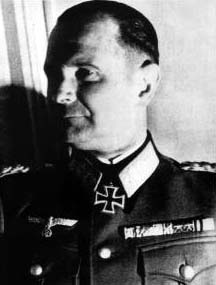
For many Italian soldiers, this has been their first experience of combat. The Italians have lost 180 men, the Germans 300. After the long negotiations & poor performance of troops in battle, Lanz has lost patience with Lt. Col. Barge & replaces him with Maj. von Hirschfeld >>107
16 September sees a lull in fighting. Certainly, the Italians' first priority is defence but it is possible that Gandin & other Commanders do not fully realise how much they have rattled the Germans and, rather than push home their advantage, they pause >> 108
For the Germans, on the other hand, this is a day of fresh troops from the Edelweiss and Jäger Divisione landing in the Bay of Aghia Kiriaki. These arrivals will continue until 20 September. These are seasoned experienced troops for whom the Italian conscripts are no match >> 109
17 September 1943, Gandin orders a concentrated attack on German positions around Karkadata, abandoned by the Italians a week ago. Fighting is bitter & bloody and continues until 10.30 a.m. the next day. Three Italian battalions come within striking distance of Karkadata >> 110
However, the balance is tipped by air power. Indeed, German forces can depend on the support of 25 Stukas. N° 1 Battalion of the 317th Infantry is completely wiped out at the Kimonico Bridge: 400 men & 37 officers, including Capt. Olivieri & Carabiniere Capt. Guasco >> 111
This story is repeated on 18 & 19 September. The Italians fight fiercely & bravely in an attempt to gain positions, often gaining ground, but are eventually overcome by superior firepower, especially from the air >> 112
On 18 September, Gen. Gandin sends a motor launch to Brindisi, where Italian High Command is now located, to request help. It takes 3 days to arrive, having to avoid enemy craft & mines >> 113
Up to this point the Allies have refused to intervene & refused permission for Italian vessels or aircraft to intervene, perhaps wary of their motives. Now, finally, on 22 September, they decide to bomb the German air base at Araxos, where the Stukas are based >> 114
It is too little, too late. By this time the battle is over and the massacre has begun. Given the tenacity of the Italian forces, it is quite possible that an earlier intervention may have allowed many or some of the Acqui Division soldiers to be rescued >> 115
On 20 September, Gandin tours the frontline, encouraging his troops. They find him tired but determined, optomistic even, trusting in intervention by Allied aircraft. During the night of 20-21 September, troops of 104th Jäger-Division attack 317th Infantry around Karkadata >> 116
The Italians, commanded by Lt. Col. Siverio have already been subjected to heavy bombardment and, overwhelmed, they are forced to surrender. 19 officers, including Capt. Pantano, and 148 men are executed on the spot >> 117
This scenario is repeated throughout the day on 21 & into 22 September. Every time an Italian position is overrun, all prisoners are immediately executed, at Karkadata, Kutsuli, Dilinata, Kuraklata, Pharsa, Davgata, Razata, Frankata >> 118
At Troianata, 32 officers & 602 men taken prisoner are gunned down. When the machine guns fall silent, a German calls in Italian for anybody still alive to stand up as they will be spared. 15 men answer the call & are shot. Just 3 survive by not falling for the ruse >> 119
By the middle of the day on 22 September the Italians are in a hopeless position, almost out of ammunition. Gandin has spent the morning alongside his troops helping man an anti-aircraft battery in a vain attempt to fight off Stukas. At 2 p.m. he surrenders unconditionally >> 120
1,315 of his men have died in battle. 5,325 have been or will be massacred after surrendering. The massacre continues for days, until 28 September. Bodies are burnt or loaded onto ships that are sunk offshore. Some Italians escape capture & are hidden in Greek homes >> 121
Those who escape include Capt. Postal, Capt. Tomasi & Capt. Pampaloni. The latter is captured with other men from his battery by troops of the Edelweiss but,when they are executed, he is the only survivor, a bullet passing through his neck without hitting anything vital >> 122
On 24 September 1943, at San Theodoro, 129 officers are executed against the wall of the 'casetta rossa'. These include Gen. Gandin, Lt. Col. Fioretti, Gen. Gherzi, Col. Romagnoli, Commander Mastrangelo, Maj. Filippini, Col. Cessari, Col. Ricci, Capt. Olivieri & Capt. Gasco>>123
Not all captured Italians were executed. Many who were captured days after the surrender were loaded onto ships to be transported to labour camps in Germany or Poland. 1,264 of these died when the ships transporting them sank after hitting mines >> 124
Of those deported to labour camps, few survived. Figures vary greatly, also because the Acqui Division suffered s similar fate on other islands, such as Corfù & records were confused but it is estimated that losses for Cephalonia were 10,260 out of a total of 12,025 men >> 125
And what happened to Capt. Renzo Apollonio, the most famous (and for some the most controversial) survivor of the Cephalonia massacre? He had been the first to order his battery to open fire on the Germans on 13 September (see tweets 67 & 68) >> 126
As many other surviving members of the 33rd Artillery, he was captured by troops from the Edelweiss on 21 September. Placed under guard in a clearing, following the scenario seen elsewhere, he and others awaited their fate >> 127
He & another soldier lean back to back against the trunk of an olive tree. The bursts of machine gun fire arrive. The other soldier is hit instantly & falls on top of Apollonio. The Germans give a cursory kick to the bodies to check they are dead. Apollonio remains immobile >>128
When he decides it is safe to move, he returns to his artillery pieces & disables them so they cannot be used by the Germans. He then uses a self-propelled artillery piece captured from the Fauth tactical group to continue shelling German positions until the surrender >> 129
He finds refuge with a Greek family (it is estimated that about 60 surviving Italians were saved thus) and is recaptured several days later. As with other prisoners taken later, there are no executions. The ruthless Edelweiss & Jäger Divisions have moved on to Corfù >> 130
Apollonio, however, has a price on his head for being the first Italian officer to order his troops to open fire. In the prison camp he is recognised & is only saved from execution by intervention of Lt. Lange, one of the Germans he saved on 13 September (see tweets 75 & 76)>>131
In 1944, Apollonio took part in the liberation of Cephalonia, along with Capt. Pampaloni, at the head of a unit called "Banditi della Acqui" supporting the Greek resistance. We mustn't forget that Greek resistance fighters assisted the Acqui in 1943, suffering heavy losses >> 132
To end, a brief look at the largely inconclusive legal process & few prosecutions that arose from the Cephalonia massacre after the war. The officer most directly responsible, Maj. Harald von Hirschfeld was never prosecuted, having been killed fighting in Poland in 1945 >> 133
Lt. Col. Barge, Commander of German forces on Cephalonia, was not prosecuted because, after being replaced by von Hirschfeld, on the orders of Gen. Lanz, he left the island before the massacre started >> 134
Various investigations have been opened over the years in Italy & Germany, without leading to convictions due to passage of time, lack of evidence or political convenience. Only 2 people have been convicted for involvement in the massacre, only 1 served time in prison >> 135
At the Nuremberg Trials, Gen. Lanz (photo), Commander of 22nd Mountain Corps was convicted only for the killing of Gandin & other officers. He was sentenced to 12 years' imprisonment but only served 3, being released in 1951. He died in 1982. Why was his sentence so light? >> 136 

The reason is that nobody appeared or presented evidence on behalf of the Italians, not even the Italian state, thus the court was forced to accept that there was insufficient evidence to convict Lanz of responsibility for the massacre as a whole >> 137
The only other person convicted for events on Cephalonia in September 1943 is Corporal Alfred Stork of the Edelweiss Division, sentenced to life imprisonment by a military court in Rome in October 2013. Convicted in his absence & aged 90, Germany refused his extradition >> 138
Just a short personal note to finish. If anybody repeats the stereotype of Italian soldiers in WWII having no stomach for a fight, just tell them the story of Cephalonia & see what they say. The Italians were poorly equipped, often poorly led but they were no cowards // 139 ends.
• • •
Missing some Tweet in this thread? You can try to
force a refresh





